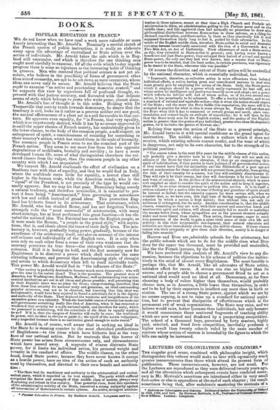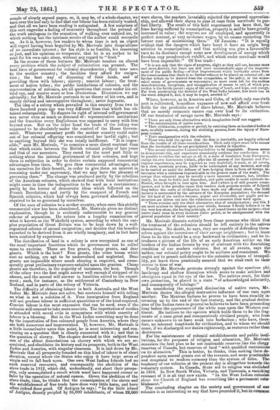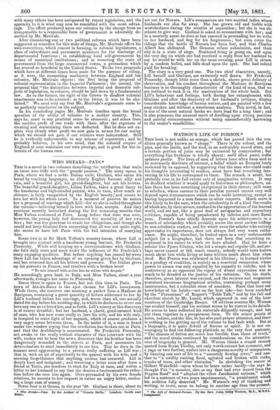LECTURES ON COLONIZATION AND COLONIES. * Twa singular good sense, combined
with philosophic insight, which distinginshes this volume would make us bear with equanimity much greater inconveniences than those which attend its present form of publication. These inconveniences, however, are not small. For the Lectures are reproduced as they were delivered twenty years ago, and all the alterations which subsequent events have rendered neces- sary in Mr. Merivale's assertions are introduced either in very small foot-notes or else in appendices at the end of each chapter ; the result sometimes being that, after sedulously mastering the contents of a • "Adana** Colonisation and Colonies. Delivered before the `University of Oidord in 1889, 1840, and 1841. By Herman Merlyn* A.M., Professor °freak:id Economy. New Edition. London : Longman.
couple of closely argued pages, or, it may be, of a whole chapter, we turn over the leaf only to find that our labour has been entirely wasted, and that all we have been reading is antiquated. A few surprises of this sort engender a feeling of insecurity throughout the perusal of the work analogous to the sensation of walking over untried ice, to which nothing but the intrinsic merits of the author could reconcile us. As it is, however, few readers to whom time is not an object will regret having been beguiled by Mr. Merivale into disquisitions of no immediate interest ; for his style is so forcible, his reasoning so just, and his opinions so temperate, that he is an author to be read for his own sake alone, without any regard to "fruit."
In the course of these lectures Mr. Merivale touches on almost every problem which the subject of colonization can present. The best form of government for colonial dependencies ; their true uses to the mother country ; the facilities they afford for emigra- tion ; the best way of disposing of their lands, and of providing them with labour; slavery ; convict labour ; the treat- ment of native tribes; the public institutions of colonies, and the representation of colonies, are all questions that come under his cri- tical eye, and receive more or less illustration. Illustration we say advisedly ; for Mr. Merivale pretends to no theory of his own, and is simply critical and interrogative throughout ; never dogmatic. The idea of a colony which prevailed in this country from two to three hundred years ago was very different from that which has ob- tained subsequently. To dispute its right of internal self-government was never even so much as dreamed of : representative institutions and the franchise every Englishman was supposed to carry with him beyond seas. But on the other hand the Trade of the colony was supposed to be absolutely under the control of the Home Govern- ment. Whatever pecuniary profit the mother country could make out of her colonial offspring was considered her lawful right ; but to anything beyond this she was totally indifferent. "It is impos- sible," says Mr. Merivale, "to conceive a more direct contrast than that which exists between the British colonial policy of late years and that of our ancestors. They cared for the most part little or nothing about the internal government of their colonies, and kept them in subjection in order to derive certain supposed commercial advantages from them. We give them commercial advantages, and tax ourselves for their benefit, in order to give them an interest in remaining under our supremacy, that we may have the pleasure of governing them." The change was produced partly by the rebellion of the American colonies, which showed that with local institutions might come in time the indisposition to be used as a convenience; partly by the horror of democratic ideas which followed on the French Devolution; and partly by the conquest of French and Spanish colonies, which had always been governed absolutely, and required to be so governed by ourselves.
Of the uses of colonies to a mother country, when once this strictly commercial view has been abandoned, Mr. Merivale gives no distinct explanation, though he is evidently unfavourable to any general scheme of separation. He enters into a lengthy examination of what is known as the Wakefield system, according to which the sur- plus population of Great Britain was to be kept down by a well- organized scheme of annual emigration ; and decides that the benefits expected to be derived from it are wholly imaginary, and in fact have been confuted by experience.
The distribution of land in a colony is now recognized as one of the most*important functions which its government can be called upon to exercise. There are free grants, cheap grants, and dear grants. Which is the best ? Free grants, like other boom which cost us nothing, are apt to be undervalued and neglected. Dear grants are impossible where much clearing is required, and conse- quently great preliminary expenses entailed upon the grantee. Cheap grants are therefore, in the majority of instances, the best. Though of the other two the first might answer well enough if stripped of its abuses, and the second will answer in localities suited to the experi- ment ; such, for instance, as the settlement of Canterbury in New Zealand, and in parts of the colony of Victoria.
The difficulty of obtaining labour in both Australia and the West Indies Mr. Merivale does not solve, but contents himself with telling us what is not a solution of it. Free immigration from England will not produce labour in sufficient quantities or of the kind required. Convict labour is the most expensive that can be used, even if the colonies will consent to take more convicts. The importation of coolies is attended with moral evils in comparison with which scarcity of labour is a blessing. But in the West Indies something may be done by the importation of free coloured people from America, where they are both numerous and impoverished. If, however, Mr. Merivale is a little inconclusive upon this point, he is most interesting and con- vincing on a question that is closely connected with it ; and that is the question of slavery. The chapter devoted to this subject forms one of the ablest dissertations on slavery with which we are ac- quainted, and elucidates its history and its prospects, both in the West Indies and America, with singular clearness. It is laid down by Mr. Merivale that all prosperity founded on this kind of labour is of short duration, except where the States who enjoy it have large areas of virgin soil to fall back upon. Our own West Indian Islands had no such reserved resources, and consequently the abolition of the slave trade in 1812, which did, undoubtedly, cut short their prospe- rity, only accomplished a result which must have happened sooner or later by the operation of natural causes. Given the abolition of the slave trade, then, he thinks that the emancipation of the slaves and the establishment of free trade have done very little harm, and have often indeed done good. Of Antigua he says : "In the little island of Antigua, densely peopled by 35,000 inhabitants, of whom 28,000,,
were slaves, the masters invariably rejected the proposed apprentice- ship, and allowed their slaves to pass at once from servitude to per- feet liberty. The result of this bold experiment has been that, far from having suffered by emancipation, property is said to have greatly increased in value; the negroes are all employed, and apparently in perfect content, at very moderate wages. by no means exceeding the former cost of maintaining them." Of Jamaica "It is equally evident that the dangers which have beset it have an origin long anterior to emancipation ; and that nothing can give a favourable turn to its destinies except some new development of energy which freedom may peradventure exhibit, and which under servitude would have been impossible." Of free trade :
"It is not only that the signs of progress, slight as they still are, become morn and more distinct, bat there are still more unmistakable signs of the improve- meet of the public feeling—of that improvement which inevitably arises from the coneciossnees that there is no farther reliance to be placed on external aid ; a. farther tribute to be derived from the sympathies, or the policy, or the econo. mical errors of governments er eonsumere; no more room left for the endless miscalculations, deceptions, and misapplication of means to end, of which pro- tection is the fertile parent: signs of the arousing of heart, and hope, and ener'. Far from accelerating the downfal of the West India interest, free trade has at the worst delayed it, and, it may be hoped, averted it."
Where, however, as in America and Cuba, of which only one-sixth part is cultivated, boundless expanses of new soil afford ever fresh fields for the profitable use of slave labour, Mr. Merivale believes that no merely economic causes can ever lead to its extinction. Of our treatment of savage races Mr. Merivale says :
" There are only three alternatives which imagination itself can suggest:
" The extermination of native races.
" Their civilization, complete or partial, by retaining them as insulated bodies of men, carefully removed, during the civilizing process, from the injury of Euro- pean contact. Their amalgamation with the colonists.
"Those who hold the opinion that the first is inevitable, are happily relieved from the trouble of all these considerations. Their only object must be to ensure that the inevitable end be not precipitated by cruelty or injustice.
"The second alternative I cannot but believe to be impossible. Reason seems to demonstrate this, and experience abundantly confirms her conclusions. If it be possible to civilize the savage at all, in a state of insulation from Europeans, except his own instructors (which, after the ill success of the Spanish and Por- tuguese experiments, may be regarded as very doubtful), it must, at all events, be a slow, uncertain process, liable to be interrupted at any moment, and only to be carried on under the defence of laws hedging them in from all foreign ia- tercourse with a strictness impracticable in the present state of the world. The savage thus educated may be morally a more innocent creature, but, intellec- tually, he must be feeble and dependent, and quite unable to resist extrinsic in- fluence, when brought to bear upon him. And (which is of still greater cense- queue ,e and is the peculiar cause that renders such projects certain of failure) long before the seeds of civilization have made any effectual shoot, the little nursery is surrounded by the advance of the European population; the demand for the land of the natives becomes urgent and irresistible, and pupils and in- structors are driven out into the wilderness to commence their work again. "There remains only the third alternative, that of amalgamation; and this I am most anxious to impress upon your minds, because I firmly believe it to be the very key-stone, the leading principle, of all sound theory on the subject—that native races must in every instance either perish, or be amalgamated with the general population of their country."
Mr. Merivale dissents entirely from those persons who think that the treatment of the colonists should be left entirely to the natives themselves. No doubt, he says, they are capable of defending them- selves against the incursions of their savage neighbours ; but to leave them to do this would be a step backward in civilization; and he in- troduces a picture of the life of an early American settler on the borders of the Indian forests by way of contrast with the flourishing condition of our modern colonies. But at all events, says the author, our colonial policy ought to be uniform and consistent. We ought not to preach self-defence to the colonies in times of tranquil- lity, yet leave them practically assured that we shall rush to their rescue in time of war.
Finally Mr. Merivale protests strongly against the spurious phi- lanthropy and shallow hberalism which seeks to make settlers and aborigines equal in the eye of the law. The natives must, for their own protection, be pined in a state "of acknowledged inferiority, and consequently of tutelage." In considering the supposed diminution of native races, Mx. Merivale denies the alleged destructive influence of one race upon another. The Mexican Indians Ile proves to have been steadily in- creasing up to the end of the last century, and the gradual declen- sion of the Indian races in general he believes to have been proceeding long before the appearance of the white man upon the Western con- tinent. He inclines to the opinion which holds them to be the frag- ments of a once great and comparatively civilized people, who from causes unknown to us have sunk into barbarism ; who have, there- fore, no inherent inaptitude for civilization, and to whom we should come, if we discharged our duties righteously, as restorers rather than destroyers. For the maintenance of colonial establishments and public insti- tutions, for the purposes of religion and education, Mr. Merivale considers the best plan to be not inalienable reserves like the clergy reserves of Canada, but reserves of land "with qualified restrictions on its alienation." This is better, he thinks, than making them de- pendent upon annual grants out of the revenue, and more practicable and congenial to modern economy than the system of tithe. The tendency of our colonies at the present day is altogether towards the voluntary system. In Canada, State aid to religion was abolished in 1856. In New South Wales, Victoria, and Tasmania, a vanishing remnant of it is all that now exists. "In the West Indian colonies alone the Church of England has something like a permanent esta- blishment."
The concluding chapter on the society and government of our colonies is as interesting as any that have preoeded it, bat in coninaon with many others has been antiquated by recent legislation, and the appendix to it is what may now be consulted with the most advan- tage. The effect produced upon our colonies by the change from an irresponsible to a responsible form of government is admirably de- scribed by Mr. Merivale.
After considering one or two political reforms which have been suggested as remedies for this state of things, Mr. Merivale offers his own correctives, which consist in forming, in colonial legislatures, a class of subordinate and permanent mimsters for the discharge of departmental functions ; in establishing. local self-government by means of municipal institutions; and in removing the seats of government from the large commercial towns, a precaution which has proved so beneficial in the United States. To the two proposals which have at different times been made for the purpose of oiling, as it were, the connecting machinery between F. gland and her colonies, Mr. Merivale objects: the first being the proposal of colonial representation in the Imperial Parliament ; the second, the proposal that "the distinction between imperial and domestic sub- jects of legislation, in colonies, should be laid down by a fundamental law. As to the former, the right of the Crown to disallow colonial enactments was to be retained : as to the latter, it was to be abo- lished." We need only say that Mr. Merivale's arguments seem to us perfectly conclusive on the subject. In his concluding pages Mr. Merivale touches upon the broad question of the utility of colonies to a mother country. This, says he, must in any practical sense be economic ; and arises from the surplus profit of our trade with them after the expenses of creating and maintaining them are deducted. But he does not ex- plain very clearly what profit we now gain in return for our outlay which we should not gain if our colonies were independent. Still he is evidently unfavourable to any scheme of separation ; and he probably believes, in his own mind, that the colonial empire of England at once maintains our own prestige, and is good for the in- terests of the human race.
































 Previous page
Previous page